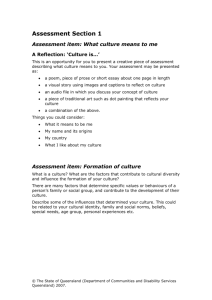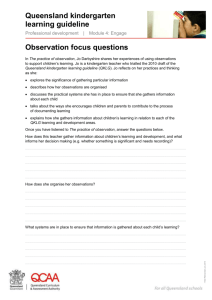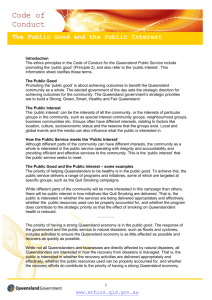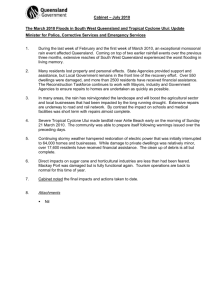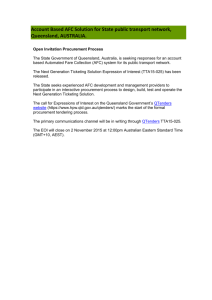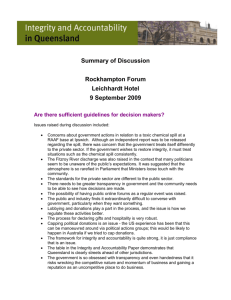Queensland`s integrity and accountability framework
advertisement
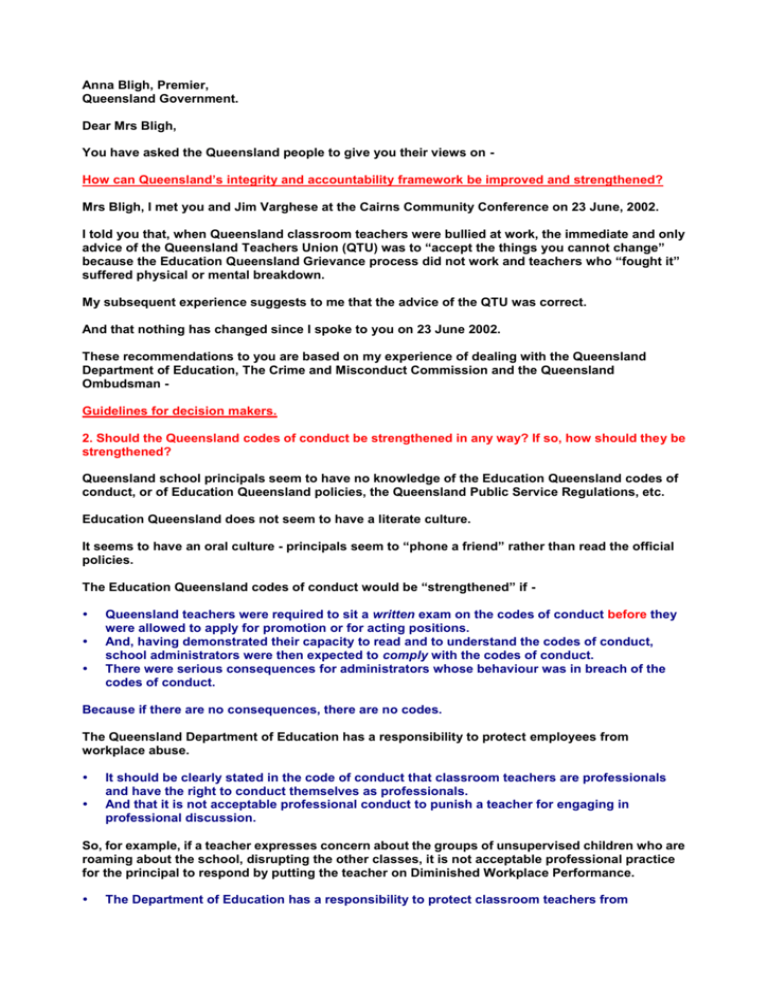
Anna Bligh, Premier, Queensland Government. Dear Mrs Bligh, You have asked the Queensland people to give you their views on How can Queensland’s integrity and accountability framework be improved and strengthened? Mrs Bligh, I met you and Jim Varghese at the Cairns Community Conference on 23 June, 2002. I told you that, when Queensland classroom teachers were bullied at work, the immediate and only advice of the Queensland Teachers Union (QTU) was to “accept the things you cannot change” because the Education Queensland Grievance process did not work and teachers who “fought it” suffered physical or mental breakdown. My subsequent experience suggests to me that the advice of the QTU was correct. And that nothing has changed since I spoke to you on 23 June 2002. These recommendations to you are based on my experience of dealing with the Queensland Department of Education, The Crime and Misconduct Commission and the Queensland Ombudsman Guidelines for decision makers. 2. Should the Queensland codes of conduct be strengthened in any way? If so, how should they be strengthened? Queensland school principals seem to have no knowledge of the Education Queensland codes of conduct, or of Education Queensland policies, the Queensland Public Service Regulations, etc. Education Queensland does not seem to have a literate culture. It seems to have an oral culture - principals seem to “phone a friend” rather than read the official policies. The Education Queensland codes of conduct would be “strengthened” if Queensland teachers were required to sit a written exam on the codes of conduct before they were allowed to apply for promotion or for acting positions. And, having demonstrated their capacity to read and to understand the codes of conduct, school administrators were then expected to comply with the codes of conduct. There were serious consequences for administrators whose behaviour was in breach of the codes of conduct. Because if there are no consequences, there are no codes. The Queensland Department of Education has a responsibility to protect employees from workplace abuse. It should be clearly stated in the code of conduct that classroom teachers are professionals and have the right to conduct themselves as professionals. And that it is not acceptable professional conduct to punish a teacher for engaging in professional discussion. So, for example, if a teacher expresses concern about the groups of unsupervised children who are roaming about the school, disrupting the other classes, it is not acceptable professional practice for the principal to respond by putting the teacher on Diminished Workplace Performance. The Department of Education has a responsibility to protect classroom teachers from principals who maliciously “beat up” trivial incidents or imaginary “complaints” to justify putting the teachers into the Managing Unsatisfactory Performance program. District Office staff need to be more active in protecting teachers from workplace abuse. So, for example, if an “acting” principal contacts the District office on her third day of “acting” and boasts that she is going to put a classroom teacher on Managing Unsatisfactory Performance, alarm bells should ring in that district office. Steps should be taken immediately to protect the classroom teachers at that school from workplace abuse. And the “acting” principal should be closely mentored and helped to understand and to comply with the Departmental policies. The continual generation of “new” codes of conduct or official policies is not enough. Compliance with the codes of conduct should be measured. And it should be measured by an independent body. So, for example, in July 2002 - less than one month after I spoke to Anna Bligh - the QTU reported that “more and more” QTU members were being bullied into ill health retirement. Does this teacher abuse continue? This needs to be measured. Managing conflicts of interest 4. How could safeguards to ensure conflicts of interest are appropriately managed be improved? It needs to be clearly stated in the code of conduct that Queensland public service administrators must not pressure subordinate officers to join their own branch of a political party. I have disclosed, in my letter to Robert Needham dated 26 February 2009, the continuing conflict of interest on the grounds of political belief that seems to have affected / corrupted the CMC / Education Queensland Investigation process and the Freedom of Information process in my own case. Any public service officer who writes any report / “Briefing For The Minister” / makes any decision concerning a teacher should be required to state at the end of the document that they understand the concept of “conflict of interest” and that they have no conflict of interest in taking this action. Members of promotion panels should be required to sign a statement that they understand the concept of “conflict of interest” and that they have no conflict of interest in making this promotion decision. So, for example, when a new Information Commissioner is appointed, each member of the interview panel should be required to state that they have no conflict of interest in making this appointment. CMC / Education Queensland investigations should not be controlled / managed / supervised by the person whose behaviour is being investigated. The CMC should not “liaise” concerning an investigation with the person being investigated. That person’s “advice” concerning the teacher or the investigation should not simply be copied down by the CMC officers into their official records. Transparency 23 a. Is information about the decision-making processes of Government sufficiently available? No, because - Education Queensland, the CMC and the Queensland public service seem to operate as a fact-free zone. They seem to operate as an oral culture. Decisions concerning teachers seem to be based on malicious gossip and “feelings” that principals (and junior CMC officers) claim to be experiencing concerning the teachers. So, for example, a principal who has not been into a teacher’s classroom or looked at their program all year can suddenly claim to have “feelings” about that teacher that require the teacher to be put into the Managing Unsatisfactory Performance Program. This is not the professional standard that I would have expected. Education Queensland “official records” are of an appalling standard. When you ask for the documentation of the reasons for a decision, you are provided with a jumble of scribbles on sticky-notes and scraps of paper. It is very difficult to glean any meaning from these scribbled notes. But it is entirely up to you to try to figure out what is being alleged against you in the scribbles. This appalling standard of documentation facilitates the workplace abuse. All allegations concerning a teacher should be typed in sentences on a form which has a space for the teacher to respond to the allegations. Allegations should concern facts, not feelings that the principal claims to be experiencing. No allegation should be placed on a teacher’s official record until after the teacher has had the opportunity to read the allegation and to respond to the allegation in writing. There should be consequences for principals who make secret collections of real and imaginary allegations concerning classroom teachers. All teachers should be encouraged to examine, sign and date their official records at least once a year. I have described in my letter dated 29 July 2009 to Robert Needham (and all attendees at the Australian Public Sector Anti-Corruption Conference 2009) the letter to me from Helen Couper, Director, Complaints services, CMC dated 4 January 2007, in which she advised me that “Departmental officers … explained to you the reasons for the alteration of some of the records, in part arising from the paraphrasing of your words by departmental officers.” This is absolute gibberish. I met Ken Smith and Peter Edwards. I recorded these meetings. Neither of them said anything so ridiculous. And no other “departmental officer” has ever attempted to fob me off with this sort of gibberish. When I made an FOI request for the Departmental “record” from which Helen Cooper had copied this gibberish, I was told that there was no documentation and that Helen Cooper had little memory of what she had written. But this gibberish is now on my official record. And decisions concerning me have been based on this gibberish. This is not the professional standard that I would have expected. All investigation reports, “Briefings to the Minister”, letters, etc. prepared by public servants should have a bibliography, listing the documents used in preparing the final document. When there is no bibliography there is no transparency. there is no Freedom of Information. and decisions concerning Queensland teachers are based on malicious gossip and absolute gibberish. Prevention 25. How could prevention measures be enhanced? Queensland classroom teachers who disclose child abuse by another teacher seem to be at great risk of “payback” allegations. Classroom teachers who disclose child abuse should be supported and protected for longer than one year. This protection should be organised at a district level. So-called “Natural Justice” - as practiced in Education Queensland and the Queensland public service - is being abused to teach children to lie, reward poor behaviour and facilitate systemic corruption. So, for example, in one particular school, a teacher followed the School Behaviour Management Policy. She gave misbehaving children three warnings and then sent them to the principal. The children were simply allowed to lie to the principal about their behaviour and about the teacher. The children’s lies were accepted, recorded and placed secretly on the teacher‘s “official record”. And this process of allowing poorly behaved children to lie about their own behaviour and about the teacher - and to escape the consequences of their poor behaviour - was called “Natural Justice”. This “Natural Justice” rewards poor behaviour. These children were being taught to lie. The CMC / Education Queensland investigation process works in a similar manner The CMC hands the investigation back to the department. Over a period of several years, the Ethical Standards Branch produce a “Final Outcome Advice” full of gibberish. And the CMC “accept” the gibberish and declare your case “considered closed”. And then they refuse to read your letter telling them that they have been fobbed off with gibberish. Queensland teachers are not safe in this environment. “Natural Justice” is not working. We need real justice in Queensland. 26. Are there any other ways the CMC could assist public sector agencies to build capacity to prevent inappropriate conduct? The Queensland public service promotion process seems to facilitate corruption. In New South Wales in 1980 I was inspected for a whole day. My program was carefully examined. I was required to lead a staff meeting while being observed. And then I was placed on the NSW “Primary Promotion List One”. The Education Queensland promotion selection process seems to be far less rigorous. Many Queensland school principals do not seem to be able to read, write, listen and think very well. They seem to be selected because they “interview well”. But psychopaths “interview well“. And working with psychopaths is very, very difficult for teachers. The Education Queensland promotion system should be far more rigorous. Promotion should be based on real ability. Or, as more and more teachers with lower and lower levels of literacy are accepted into university eduction courses, intelligent Queensland teachers are going to be at greater and greater risk of workplace abuse. Education Queensland investigations - and internal reviews - need to be conducted by intelligent, literate people who have no conflict of interest and who have sufficient integrity to “find” the truth. This is not the case in Education Queensland at the present time. Queensland teachers need to be protected from “joke” allegations concerning them “payback” allegations malicious “beat up” allegations. Queensland teachers who are the subject of allegations need to be given a copy of the allegations in writing allowed to respond in writing have their response read and “considered” by an intelligent, literate person with no conflict of interest in the situation. I would suggest that these simple measures would not only protect Queensland teachers from workplace abuse, they would prevent the waste of public resources. Queensland taxpayers’ money should not be used to protect psychopaths and to facilitate the abuse of Queensland classroom teachers. 28. How could the current legislative protections for whistleblowers be enhanced? Writing yet more documents / policies / codes / legislative protections is not the answer. Abusive principals do not know about the official policies, they do not understand them and they do not apply them. They do seem to know that nobody in authority cares about the policies. And that there will be no consequence if they disregard the policies. All Queensland government policies / codes / legislative protections would be “enhanced” - and there would be less need to whistleblow - if they were known about, understood, respected and enforced. Are the mechanisms to find unacceptable behaviour sufficient? 29. Are the current systems and processes in place to manage investigations appropriate? Education Queensland must stop exploiting Aboriginal employees to conduct faux “internal reviews”. For example, it is not appropriate for a young man who identifies as an Aboriginal - a person from a primarily oral culture - a person with no qualifications in education, law or psychology, to be asked by Education Queensland to “internally review” a complaint of discrimination that has been made by an English-born, well-qualified, older woman teacher. And it is not appropriate for the Aboriginal “internal reviewer” to be instructed to base his “internal review” on a mass of falsified “records’ that have been secretly placed on the teacher’s official records. not to speak to the teacher. not to communicate with her by email. not to “consider” her responses to the falsified “records”. not to ask any questions about the conflict of interest on the grounds of political belief. Aboriginal people have suffered abuse for generations. And now Education Queensland seems to be exploiting young Aboriginal public servants to facilitate the abuse of older women teachers. Education Queensland must stop splitting complaints up into parts to make it easier to “find no evidence” of corruption. For example, it is not appropriate to respond to a complaint concerning workplace bullying by conducting an internal review based on a mass of falsified “records” that have been secretly placed on a teachers’ official files. for the “internal reviewer” to “find” that there is no evidence of bullying in the falsified “records”. to describe the internal review as an investigation in the CMC official records, thus concealing the fact that it was only an “internal review” and the internal reviewer was not allowed to ask any questions about the conflict of interest. then to wait for more than a year before conducting an investigation into the falsification of the official records. and then to stop that “investigation” as soon as it has been established that the documents were placed on the teachers’ official records secretly. Thus preventing the investigator from “finding” that the teacher’s official records were falsified. and that the teacher’s official records were falsified to conceal the workplace bullying. Sanctions for unacceptable behaviour 31. Are current disciplinary proceedings sufficient to deal with the wide range of unacceptable behaviour that public officials could potentially engage in? No. Investigations are delayed for years so that abusive principals can then claim to be unable to remember what they did or why they did it. This delaying strategy facilitates the systemic abuse. It sends a message to abusive principals that they will not be held accountable for their abusive behaviour. So abusive principals have no reason to change their abusive behaviour. “Independent investigators” are instructed to simply copy down what they are told by abusive administrators, even if it is obviously untrue. This process is not investigation. It is dictation. It is a waste of public money to employ ex-policemen to conduct investigations of this standard. It must be absolutely obvious to these ex-policemen that what they are doing is ridiculous and that they are being employed to facilitate the abuse of Queensland teachers. In this manner real investigation is avoided, but the Education Queensland faux “investigation” process facilitates yet more changes to the official “story” and the making of yet more allegations against the teacher, which are yet again copied onto the teacher‘s official records. And then the “investigation is yet again declared “closed” by Education Queensland and the CMC. Years later, when the teacher discovers these new allegations under FOI, her protests to the CMC are not read because senior CMC officers have declared her case “considered closed”. And so the teacher has once again been refused the right to respond to the allegations concerning her. The CMC / Education Queensland “investigation” process seems to be corrupt. 32. How can the current regime of sanctions for unacceptable behaviour be further enhanced to allow for appropriate responses? First, and most importantly, the Queensland government has to demonstrate that it is willing to “find” evidence of unacceptable behaviour. Abusive principals should be returned to the position at which they were employed at the time of the abuse. Then the abusive principal should be very closely monitored and 360-degree evaluated until they are able to demonstrate that they can perform their role without abusing teachers. By demonstrate I do not mean glib, confident talk. Or charming smiles. I mean documented, 360-degree proof of the use of non-abusive management strategies. Further suggestions 35. Are there any other ways Queensland’s integrity and accountability framework can be strengthened and improved? Queensland public servants and junior CMC officers seem to be reluctant to tell senior officers about disclosures. Public servants “lose” or falsify the documentation of your disclosure over and over again. They seem to edit your disclosures out of “Briefings” and out of records of phone calls. They seem to pause tape recorders to avoid making a recording of your disclosure. An ordinary Queenslander cannot find a way of making a disclosure that the Queensland public service cannot “lose”, falsify, agree not to read, edit out, or “not understand”. And then, based on “Briefings” that seem to be prepared by corrupt or very fearful public servants, the Premier, Queensland Government Ministers and senior officers sign agreements not reply to or to read - your letters. They all agree “not to know”. These agreements by Ministers and Senior officers not to read or to reply to your letters seem to be signed just before documents are released to you under Freedom of Information - documents which reveal the full extent of the corruption. When you first complain to the CMC, you may not realise the full extent of the corruption that you are dealing with. No normal person could possibly imagine the extent of the incompetence / corruption. So your first complaint may be dismissed as “not serious” by the CMC and returned to the “unit concerned” - to the people whose behaviour you are complaining about. Then, when you gradually discover the full extent of the corruption, your letters disclosing the corruption are not read by junior CMC officers - because their senior officers have declared your case “considered closed”. The Queensland government must demonstrate a willingness to “know” about corruption. allow public servants to read letters disclosing corruption. allow public servants to “know about” and to record disclosures. Human Rights and Equal Opportunity Commission-trained “Discrimination Solicitors” seem to be being employed by Education Queensland to facilitate discrimination by “losing” - or refusing to release under FOI - the documentary evidence of discrimination. Or by “finding” documents that introduce continual changes to the official story. HREOC need to take steps to ensure that their employees do not use their HREOC training to facilitate discrimination and workplace abuse throughout all Queensland government departments. Yours sincerely, Robina Cosser, M.Ed (SYD) Editor : The Teachers Are Blowing their Whistles http://www.theteachersareblowingtheirwhistles.com/ Member of the national committee of Whistleblowers Australia

